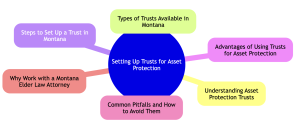Introduction to Trusts for Asset Protection
Trusts for asset protection are strategic tools that guard you against creditors and legal judgments.
By setting up the right trust, you can ensure that your assets are protected, managed, and eventually transferred according to your wishes with privacy and efficiency.
This guide will outline key types of trusts, such as revocable, irrevocable, and asset protection trusts, highlighting their benefits and how they can help mitigate estate taxes and provide efficient estate planning. Additionally, we’ll explore the essential legal considerations specific to Montana, to help you align with state laws and maximize your asset protection.
Montana Elder Law is happy to provide this article, hoping it will be useful for the communities we serve. Please call if you need any more information!
Key Takeaways
- Diverse Options: Explore various types of trusts, from revocable to irrevocable.
- Protection Strategies: See how trusts can shield your assets from unforeseen claims.
- Legal Framework: Understand the statutes that govern trusts in Montana.
- Implementation Steps: Learn how to establish a trust effectively.
- Advantages of Trusts: Discover the benefits of asset protection and tax considerations.
Understanding Asset Protection Trusts
An Asset Protection Trust (APT) specifically protects ones’ wealth from creditors and legal challenges. In Montana, APTs offer a robust legal structure that, once correctly set up, provides a formidable barrier against asset seizure and excessive taxation.
- Irrevocable Nature: APTs are typically irrevocable once established, meaning they cannot be altered or dissolved without the beneficiaries’ consent.
- Privacy: Trust documents are not public records, which keeps your financial matters confidential.
- Flexibility in Design: Tailor your trust to meet specific financial goals, including long-term asset management and distribution.
- Legal Shield: Protects against creditors and legal judgments by legally distancing the trust’s assets from your personal estate.
- Estate Planning Integration: Works in tandem with other estate planning tools to ensure a comprehensive asset management strategy.
Types of Trusts Available in Montana
Montana residents have several options when considering trusts for asset protection. Each type of trust serves a specific purpose, whether it’s flexibility during the grantor’s lifetime or strong protection after their death. Here’s a quick breakdown:
- Revocable Trusts: These allow the grantor to retain control over the assets and make changes to the trust as needed.
- Irrevocable Trusts: Once established, these cannot be altered. This rigidity offers stronger protection against creditors.
- Domestic Asset Protection Trusts (DAPT): Specific to certain states that allow them, offering a way to shield assets from creditors while still benefiting the grantor.
- Foreign Asset Protection Trusts: Located offshore, these often provide even greater protection from creditors and legal judgments but come with higher costs and complexity.
Comparison of Trusts
| Type of Trust | Control by Grantor | Protection Level | Cost and Complexity |
| Revocable | High | Moderate | Low |
| Irrevocable | None | High | Moderate |
| Domestic APT | Moderate | High | Moderate |
| Foreign APT | Moderate | Very High | High |
Steps to Set Up a Trust in Montana
Choosing the Right Trust Type
Selecting the right type of trust depends on your goals for asset protection, tax planning, and control over the assets. Consider what’s most important to you: flexibility or security.
Legal Requirements
In Montana, creating a trust requires a written document specifying the trust’s terms, appointing a trustee, and clearly identifying the beneficiaries. Legal guidance is crucial to ensure compliance with state laws and to optimize the trust structure for tax benefits.
Funding the Trust
To effectively protect assets, you must transfer them into the trust. Transferring assets include tangible assets like property and intangible assets like stocks or business interests. For each type of asset, you must correctly title them to the trust to ensure protection. (1)
Advantages of Using Trusts for Asset Protection
Trusts are a proactive strategy to protect wealth.
The right trust can shield your assets from lawsuits, creditors, and even reduce your estate tax exposure.
By placing assets in a trust, they’re often legally recognized as separate from your personal estate, meaning they may not be subject to the same claims as personal assets.
Furthermore, trusts can help streamline the transition of assets to beneficiaries, bypassing the often lengthy and costly probate process. This dual benefit of protection and efficiency makes trusts an invaluable tool in estate planning.
Common Pitfalls and How to Avoid Them
Setting up trusts can be complex, and without careful planning, several common pitfalls can compromise their effectiveness. To ensure your trust serves its intended purpose without unexpected complications, here’s what to watch out for:
- Failing to Properly Fund the Trust: A trust without assets is like a car without fuel; it won’t go anywhere. Ensure all intended assets are properly transferred into the trust.
- Neglecting to Update Your Trust: Life changes, such as marriage, divorce, or the birth of a child, necessitate updates to your trust to reflect your current wishes.
- Overlooking Local Laws: Trust laws vary by state; ensure your trust adheres to Montana’s specific legal requirements to avoid any legal challenges.
- Choosing the Wrong Trustee: The trustee manages the trust, so their integrity and capability are paramount. Choose wisely.
- Ignoring Tax Implications: Misunderstanding the tax obligations related to trusts can lead to costly mistakes. Consult with a tax professional.
Why Work with a Montana Elder Law Attorney?
Navigating the complexities of trust formation in Montana requires not just legal expertise but also a nuanced understanding of local statutes and tax implications. Here’s why consulting a specialized elder law attorney is critical:
- Expertise in State Law: Montana-specific legal knowledge is crucial for drafting a trust that meets all legal standards and effectively protects your assets.
- Strategic Planning: An elder law attorney can provide strategic advice on how to structure your trust to meet both your immediate needs and long-term goals.
- Avoid Legal Pitfalls: With professional guidance, you can avoid common mistakes that might otherwise undermine the purpose of your trust.
- Tax Optimization: An attorney can help navigate the tax implications of your trust, ensuring that you maximize your financial benefits.
- Personalized Service: Elder law attorneys provide personalized attention to understand your unique situation and tailor the trust accordingly.
Wrapping Up – Trusts for Asset Protection with Montana Elder Law
Trusts are a vital tool for asset protection, offering both security and strategic estate planning advantages. In Montana, the legal landscape requires careful navigation to ensure your trust is set up effectively and remains robust against potential legal challenges.
Montana Elder Law is renowned for its expertise in trust and estate planning. With a deep understanding of both the opportunities and complexities presented by Montana law, they are an invaluable resource for anyone looking to secure their legacy and protect their assets. Trust them to guide you through the intricate process of trust formation, ensuring your assets are safeguarded for the future.
Visit our HOMEPAGE for more resources!
Reference:
Fidelity, What is a trust?, https://www.fidelity.com/life-events/estate-planning/trusts





